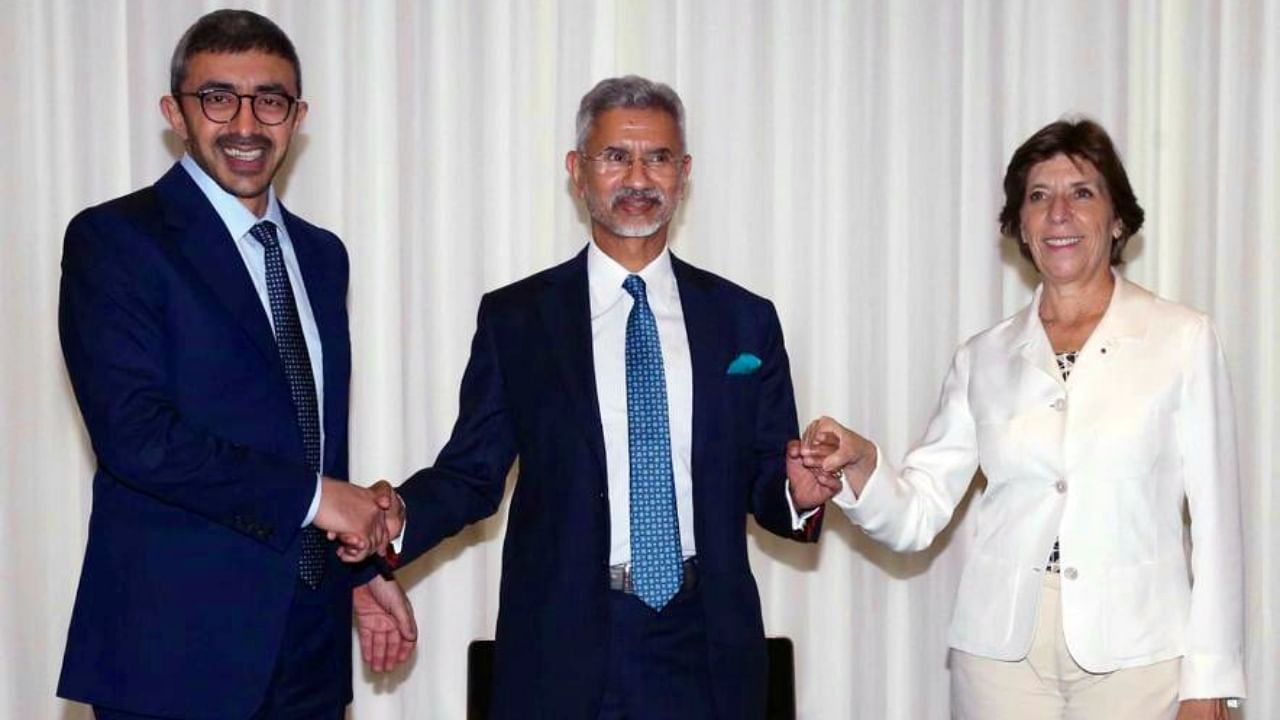
India, France and the United Arab Emirates (UAE) have moved to institutionalize a trilateral initiative, which would promote defence cooperation among the three nations, focussing on raising compatibility among the armed forces as well as on joint development and co-production of military hardware.
External Affairs Minister S Jaishankar and his French and Emirati counterparts – Catherine Colonna and Sheikh Abdullah bin Zayed Al Nahyan – had a phone-call on Saturday to follow up on the first meeting they had held in the trilateral format on the sideline of the United Nations General Assembly (UNGA) in New York on September 19 last year. The phone-call resulted in formal adoption of a roadmap for implementation of the initiative for trilateral initiative.
The India-France-UAE trilateral initiative was in the works for some time now. The diplomats have been informally calling it the “Rafale Forum” with the fighter jets manufactured by Dassault Aviation of France being the common link among the three nations. The French Air and Space Force and French Navy have been using the Rafale and Rafale M aircraft respectively. India has already procured 36 Rafale fighter jets for its air force. New Delhi and Paris are now discussing an intergovernmental agreement for procuring 26 Rafale M jets (the marine version of the aircraft) for the Indian Navy’s first indigenous aircraft carrier INS Vikrant. Abu Dhabi also in December 2021 signed a deal with Paris for purchasing as many as 80 Rafale fighter jets from Dassault Aviation.
The phone-call saw the foreign ministers of India, France and the UAE acknowledging that defence was “an area of close cooperation between the three countries”. “Therefore,” according to a joint statement issued in New Delhi, Abu Dhabi and Paris, “efforts will be undertaken to further promote compatibility, and joint development and co-production, whilst seeking out avenues for further collaboration and training between the three countries’ defence forces”.
Though India had joined several ‘minilateral’ initiatives with other nations in the past, none of them publicly focussed on defence cooperation.
The first joint statement of the India-France-UAE trilateral initiative, however, categorically identified defence as an area of cooperation.
Jaishankar, Colonna and Abdullah bin Zayed Al Nahyan agreed that the trilateral initiative would serve as a forum to promote the design and execution of cooperation projects in the fields of energy, with a focus on solar and nuclear energy, as well as in the fight against climate change and the protection of biodiversity, particularly in the Indian Ocean region. The three countries would explore the possibility of working with the Indian Ocean Rim Association (IORA) to pursue concrete, actionable projects on clean energy, environment and biodiversity.
They agreed to encourage development of trilateral cooperation between relevant academic and research institutions and efforts to promote co-innovation projects, technology transfer, and entrepreneurship. “In this context, trilateral conferences and meetings on the side-lines of high-level technology events such as Vivatech, Bengaluru Tech Summit, and GITEX will be arranged to support such cooperation.”
The ministers agreed that a range of trilateral events would be organized in the framework of India’s G20 presidency and the UAE’s hosting of the COP-28 in 2023, respectively. The three countries also agreed to expand their cooperation through initiatives such as the Mangrove Alliance for Climate led by the UAE and the Indo-Pacific Parks Partnership led by India and France. It was agreed that the three countries should seek to focus on key issues such as single-use plastic pollution, desertification, and food security in the context of the International Year of Millets-2023. The three sides also underlined their keen desire to cooperate in the field of the circular economy under the aegis of India’s Mission LiFE, according to the joint statement issued after the phone-call.
